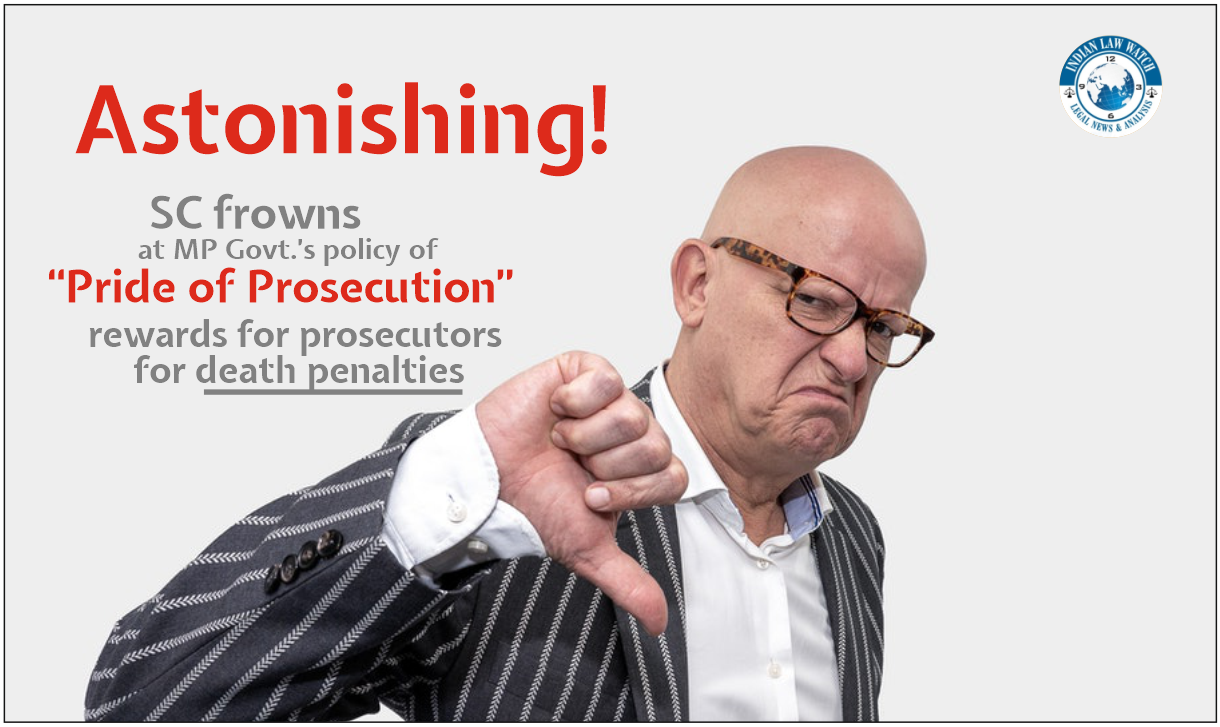
New Delhi: Irked by a policy of the Madhya Pradesh government giving weightage to public prosecutors who secure the most number of capital punishments, the Supreme Court on Thursday told the state to put its house in order and gave time till July for the state to consider withdrawing the policy.
The court was hearing a suo moto petition on having a mechanism in place for courts across the country for mitigation of death sentence cases.
The court asked attorney general KK Venugopal and amici curiae (friends of the court) senior advocate Sidharth Dave and advocate K Parameswar whether such a mechanism could be put in place and at what level during the trial proceeding.
It was during such discussion that the court came to know about the Madhya Pradesh’s policy that recognized the best prosecutors in the state with the title “Pride of Prosecution”. One of the criteria for choosing such persons was the number of capital punishments secured by him/her.
The bench of justices UU Lalit, S Ravindra Bhat and Sudhanshu Dhulia said, “You (state) are putting a carrot in front of the prosecutor and making him run in a particular direction.”
Reserving orders on the validity of such a policy, the bench remarked, “Put your house in order. These incentives must stop. We will reserve orders but it shall be open to you to withdraw it. If you stick to it, we will pass a judgment when the court reopens after vacation. You have sufficient time.”
Parameswar, assisting the court as amicus curiae, submitted that the purpose of public prosecutor is not to secure conviction but to conduct fair trial.
“Such policy affects prosecutorial independence and discretion and affects the principle of fair trial. In your tearing hurry to get maximum punishment, prosecutors may suppress certain material, thereby compromising the right of fair trial of the accused and the victim,” he said.
The court noted that the MP policy titled “Prosecution Performance Evaluattion and Monitoring System” introduced in January 2017 was revised in 2020 when 1000 weightage points were added in the evaluation of those prosecutors under five heads. One of them was the number of capital punishments secured. Interestingly, the court was told that for acquittal, there was negative grading.
“It is astonishing. A public prosecutor may have done an excellent job, yet could get acquittal. This decision is by the court, how is a prosecutor responsible for acquittal,” the bench observed.
Noting the dangers involved in accepting such a policy, the bench said, “In our system, prosecutor is placed at the centre of trial. The prosecutor can ensure a certain outcome by suppressing a fair investigation and such withholding is being incentivised.”
The state’s additional advocate general (AAG) Saurabh Mishra told the court that the state is willing to remove all those parts which the court finds offensive. He submitted that the purpose was to motivate prosecutors and enhance efficiency as there was no financial incentive or career growth attached to capital punishment.
“According to the amicus, the entire policy is offensive. By now you know the drift of things. As a matter of fact, there should never be a policy associated with outcome of judgments by courts. It should be based on some other parameters such as number of adjournments, etc. By linking these points to an outcome you are actually pushing them in a certain direction,” the bench said.
The suo moto petition was initiated by the court while dealing with a death convict’s appeal from Madhya Pradesh. An application was moved in that case by Project 39A, a death penalty watchdog which prepares the Death Penalty in India: Annual Statistics Report each year. Till end of December 2021, the report suggested there were 488 prisoners on death row, which was a 21% increase over the previous year’s figure and highest recorded since 2004 as per the National Crime Records Bureau data.
The report further showed that an overwhelming majority of death row prisoners suffered mental illness but remained incarcerated for want of legal assistance. Attorney General KK Venugopal told the court that the national legal service authority (NALSA) could be trained as a nodal authority to reach out to such convicts. He suggested that in every matter where there was possibility of death sentence, a mitigation report should be prepared and gone into. This exercise could begin after death sentence is to be awarded.
The court felt that the issue required deeper probe as it posted the consideration of the suo moto case to July. The bench felt that any exercise to be undertaken should not burden the trial judges nor take away the rights of an accused to fair trial.
SOURCE: HINDUSTAN TIMES





